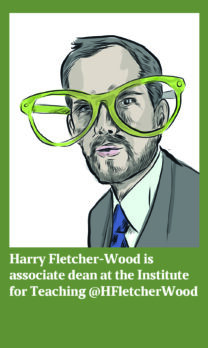Blog reviewer Harry Fletcher-Wood shares his top edu-blogs this week
On writing essays people actually want to read
@TLPMsF
Rebecca Foster marked a set of essays, and read “time and time again that ‘in Shakespeare’s Macbeth the witches are presented as…’” Originality and flair may no longer be in the mark scheme, but she still wanted her students to demonstrate such thins. So, on Wednesday morning, she “scrapped my original lesson plan and decided to tackle the issue head on”.
She banned formulaic starters like “In Shakespeare’s Macbeth…” and received responses like “isolated, manipulative and physically repelling, the witches are the most mind-contorting characters with their complex plotting and foreshadowing of events” and “like mischievous puppeteers, the witches manipulate Macbeth and drive the plot forward”. In this impressive account of the effect of changing her teaching, Foster goes on to show how she helps students improve paragraph openings, and the get-out clause she offers if they really are stuck.
@RosalindPhys
Rosalind Walker begins by reassuring us that “this is not some ghastly new 21st-century learner beanbag initiative. It’s a blog about some things that I used to do before we had our behaviour system, and why I don’t do them any more”.
She used to “compliment a pupil on their hair or bag in lesson, ask a pupil how their baby sibling/dog/BMX is getting on, tell hilarious jokes”. This improved behaviour because “pupils thought I was funny (or felt sorry for me because I was labouring under the crippling delusion that I was funny) and behaved for me because they liked me. Or they liked me because I’d shown interest in them as a person with their hair, dog, brother”.
However, with an effective school-wide behaviour policy, her actions become an impediment to student learning: “They go against the principles of our behaviour policy, that every second counts and that we should be professional at all times. So I’ve stopped myself from doing them.” She reflects that, while she regretted this initially, “I’ve realised that this is something that must happen outside of lesson: at lunch, during ‘meet and greet’ at the start of lessons, and at break. I used to hate break duty because I thought it was a massive waste of my professional time – but now I look forward to it as I can do all the stuff I’ve stopped doing in my lessons.”
@Grumpyteacher17
The Grumpy Teacher considers how easy or difficult it is to be found out in various areas, from sales and warehousing (if the numbers, or the pallets, stack up, you’re good) to art and literature (are you a bad writer or an unappreciated genius?).
“But where does teaching sit on the spectrum of art to warehousing?” he asks. You “can’t measure the performance of a teacher the way you can measure the performance of a salesman or a hedge fund manager” by explaining a career of anomalous results. His colleague’s AS results with the same group were better, for example, but why? The colleague was a better teacher, but more importantly, the time split was uneven, his own paper was sat immediately after his colleague’s and he was teaching foreign history – which is harder for students than British history. All good explanations, but as a deputy head, would you “assume I was telling the truth? Or would you assume I was making excuses? The answer, of course, is that most likely you’d be influenced by two things. Did you rate me, and did you have bosses who’d want chapter and verse on how you’d investigated anomalies in results, or not?”
I’m tempted to carve a single line from this post in stone: “just because there’s a problem doesn’t mean there’s a solution.”
Scott Alexander
Why do we disagree so much in education and in politics – even to the extent of disagreeing about our disagreements? Scott Alexander distinguishes between “mistake theorists” and “conflict theorists”. The former see us as doctors “standing around arguing over the best diagnosis and cure. Some of us have good ideas, others have bad ideas that wouldn’t help, or that would cause too many side effects.”
The latter see politics as war: “Different blocs with different interests are forever fighting to determine whether the state exists to enrich the elites or to help the people.” The author differentiates further, between “easy-mistake theorists” who think our problems come from “very stupid people making very simple mistakes” and “hard-mistake theorists” who believe that “the questions involved are really complicated and require more evidence than we’ve been able to collect so far”.
Likewise, perhaps “easy-conflict theorists” think our problems come from “cartoon-villain caricatures wanting very evil things”, while “hard-conflict theorists“ think they reflect “clashes between differing but comprehensible worldviews”. It’s a long post, but I found it helpful to place myself on the author’s spectrum and to recognise how my interpretation of events and debates has changed as my position on the spectrum has changed.













Your thoughts